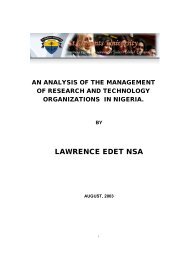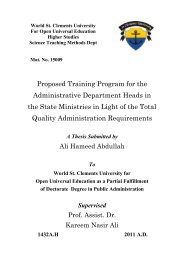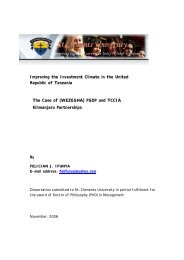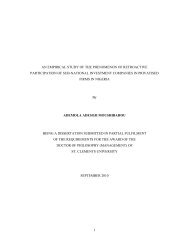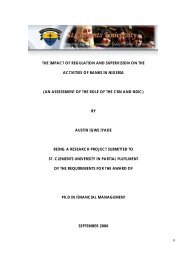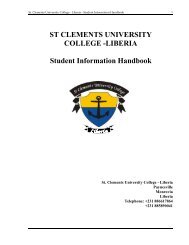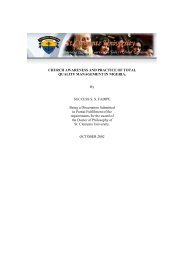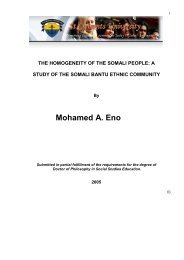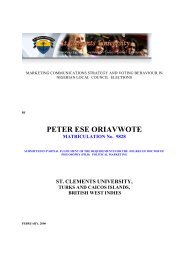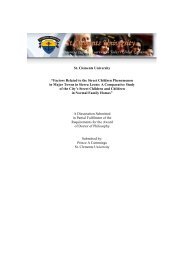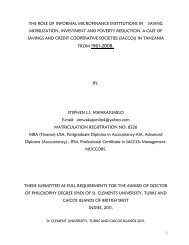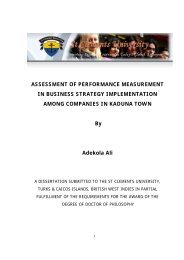- Page 1: THE CHALLENGES OF IMPLEMENTING THE
- Page 4 and 5: DEDICATION I dedicate this research
- Page 6 and 7: Abstract The Basel 2 Accord is a co
- Page 8 and 9: vii TABLE OF CONTENT CHAPTER I - In
- Page 10 and 11: viii
- Page 14 and 15: It should be mentioned that prior t
- Page 16 and 17: The NDIC itself was created in 1988
- Page 18 and 19: Nigeria as a sovereign has the addi
- Page 20 and 21: (6) Crown Merchant Bank Ltd. 1988 1
- Page 22 and 23: what makes up the Nigerian banking
- Page 24 and 25: maximum losses the bank’s counter
- Page 26 and 27: Cribb (1999) also show that in othe
- Page 28 and 29: to redeem it from the issuing bank
- Page 30 and 31: Honohan (1997) appreciated this kid
- Page 32 and 33: An amendment to the Act in 1865 gra
- Page 34 and 35: that country would become expensive
- Page 36 and 37: - Lebanon 286.8 - Belgium 257.8 - P
- Page 38 and 39: The Bretton woods agreement The Sec
- Page 40 and 41: and forms of agreements between cre
- Page 42 and 43: for losses and of Capital reserves
- Page 44 and 45: (d) The Committee promised to close
- Page 46 and 47: development banks. They are to attr
- Page 48 and 49: 20% (1) Claims on banks in Nigeria/
- Page 50 and 51: As mentioned above CBN does not mak
- Page 52 and 53: As mentioned above the Group of Ten
- Page 54 and 55: Items 41-43 - Are on the amendments
- Page 56 and 57: Item 54 directs that at national di
- Page 58 and 59: Sovereign to AA- A - to BBB- to B -
- Page 60 and 61: Item 72 states that lending fully s
- Page 62 and 63:
Item 81 states that at national dis
- Page 64 and 65:
Item 100 says whether the bank inte
- Page 66 and 67:
wider range of credit risk mitigant
- Page 68 and 69:
collateral will receive the risk we
- Page 70 and 71:
Supervisory haircuts Item 151 conta
- Page 72 and 73:
Items 173 to 177 are on the treatme
- Page 74 and 75:
- An instrument that embodies an ob
- Page 76 and 77:
(1) Composition of minimum requirem
- Page 78 and 79:
orrower and facility grades of pool
- Page 80 and 81:
Item 425 directs that borrowers and
- Page 82 and 83:
of member countries but stress that
- Page 84 and 85:
lending standards in use when the d
- Page 86 and 87:
(3) statistical default models. Oth
- Page 88 and 89:
REQUIREMENTS FOR RECOGNITION OF LEA
- Page 90 and 91:
national Supervisors when there is
- Page 92 and 93:
Item 550 defines Excess spread as g
- Page 94 and 95:
(f) An opinion must be obtained fro
- Page 96 and 97:
Item 645 outlines three methods o c
- Page 98 and 99:
Footnote to the title The Standardi
- Page 100 and 101:
Item 664 is on the Advanced Measure
- Page 102 and 103:
Under the IRB approach, a bank esti
- Page 104 and 105:
Nigeria responded to this questionn
- Page 106 and 107:
of all external financial assets of
- Page 108 and 109:
Accord is of sovereigns, banks and
- Page 110 and 111:
of this fact is that under the Base
- Page 112 and 113:
the same nationality. The rule of t
- Page 114 and 115:
sovereign ratings. The eight variab
- Page 116 and 117:
investor makes the final decision t
- Page 118 and 119:
Brazil (B2/B+/B+) China A2/BBB/A-)
- Page 120 and 121:
Latvia (A2/BBB+/BBB+) Lithuania (A3
- Page 122 and 123:
Slovakia (A3/BBB/BBB+) Slovenia (As
- Page 124 and 125:
Israel (A2/A-/A-) Malaysia (Baa1/A-
- Page 126 and 127:
Russia (Baa3/Ba2/NR) Spain Aaa/AA+/
- Page 128 and 129:
(B1/BB-/BB-) Source: Global Economi
- Page 130 and 131:
UNDER BASEL 1 AAA 0.03 8 1.6 1.13 A
- Page 132 and 133:
other on-site expenses, plus a US$1
- Page 134 and 135:
39 CHI Channel Islands - - - - 40 C
- Page 136 and 137:
108 LSO Lesotho 6 6 6 6 109 LBR Lib
- Page 138 and 139:
176 ZAF South Africa 3 3 3 3 177 ES
- Page 140 and 141:
ultimately lead to calls for offici
- Page 142 and 143:
Nigerian banks, like banks all over
- Page 144 and 145:
Totals 100.0 100.0 100.0 100.0 100.
- Page 146 and 147:
Prior to the on-going consolidation
- Page 148 and 149:
Item 726 to this end states that ba
- Page 150 and 151:
Item 743 directs the bank to establ
- Page 152 and 153:
Principle 4: Supervisors should see
- Page 154 and 155:
(4) Procedures for the efficient re
- Page 156 and 157:
number of issues which according to
- Page 158 and 159:
(j) Inability to settle guaranteed
- Page 160 and 161:
With the above developments one wou
- Page 162 and 163:
Item 760 and 761 are on how Supervi
- Page 164 and 165:
Structural Challenges - Pillar 3 Pi
- Page 166 and 167:
if investors do not know the risk p
- Page 168 and 169:
month would be the due principal an
- Page 170 and 171:
(1) Disagreement between Board and
- Page 172 and 173:
3.Implementation of Basel 2: Practi
- Page 174 and 175:
3. Implementation of Basel II in Ni
- Page 177 and 178:
CHAPTER THREE RESEARCH METHODOLOGY
- Page 179 and 180:
Decision rule For decision rule, wh
- Page 181 and 182:
Fig. 2: Response Distribution on ef
- Page 183 and 184:
4. Are there internal rating system
- Page 185 and 186:
Fig.6 Response on the issue of fore
- Page 187 and 188:
Fig.8 Response Distribution on asse
- Page 189 and 190:
Fig.10 Response Distribution on the
- Page 191 and 192:
Fig.12 Response Distribution on the
- Page 193 and 194:
Table 4.2.1: Response Distribution
- Page 195 and 196:
3. Should the following be disclose
- Page 197 and 198:
In another response it was also dis
- Page 199 and 200:
v) Geographical distribution of exp
- Page 201 and 202:
4.3 ANALYSIS OF QUESTIONS ON SUPERV
- Page 203 and 204:
Table 4.3.4 Response on the issue o
- Page 205 and 206:
BCP 24.0 Host Country Supervision
- Page 207 and 208:
10. The issue of resurgence of high
- Page 209 and 210:
When the respondents were presented
- Page 211 and 212:
hypothesis chosen are deemed true b
- Page 213 and 214:
improved working environment need n
- Page 215 and 216:
H12: Inadequate operational and fin
- Page 217 and 218:
Sub-Hypotheses on structural change
- Page 219 and 220:
SA 41 71 -30 900 12.67 A 28 71 -43
- Page 221 and 222:
Decision From the table 4.5.5 above
- Page 223 and 224:
H8: The present management capacity
- Page 225 and 226:
H10: The issue of resurgence of hig
- Page 227 and 228:
SD 36 71 -35 1225 17.25 TOTAL 284
- Page 229 and 230:
Decision The result in table 4.5.14
- Page 231 and 232:
CHAPTER V DISCUSSION OF THE RESULTS
- Page 233 and 234:
(b) It has an Operational risk mana
- Page 235 and 236:
Another significant finding in this
- Page 237 and 238:
e implemented. Judging from the cal
- Page 239 and 240:
Proof for Null hypothesis Twelve (H
- Page 241 and 242:
As shown in this research many inst
- Page 243 and 244:
anks need to fully comply with the
- Page 245:
profit that could translate into lo
- Page 248 and 249:
(b) No (c) (d) I Don’t Know. (e)
- Page 250 and 251:
(b) No If yes, what were they? (8)
- Page 252 and 253:
(1) As supervisors, would you say c
- Page 254 and 255:
(iv) Procedures for efficient resol
- Page 256 and 257:
LC (C) MNC “ 1.6 Information shar
- Page 258 and 259:
LC (C) MNC “ 11.0 Country Risk (d
- Page 260 and 261:
LC (C) MNC “ 22.0 Remedial Measur
- Page 262 and 263:
(D) NC = Noncompliant (8) How soon
- Page 264 and 265:
(a) Yes (b) No (c) I don’t know.
- Page 266 and 267:
(x) Total and Tier 1 capital ratio.
- Page 268 and 269:
(a) Yes (b) No © I don’t know. (
- Page 270 and 271:
successfully implemented. 2. The hi



